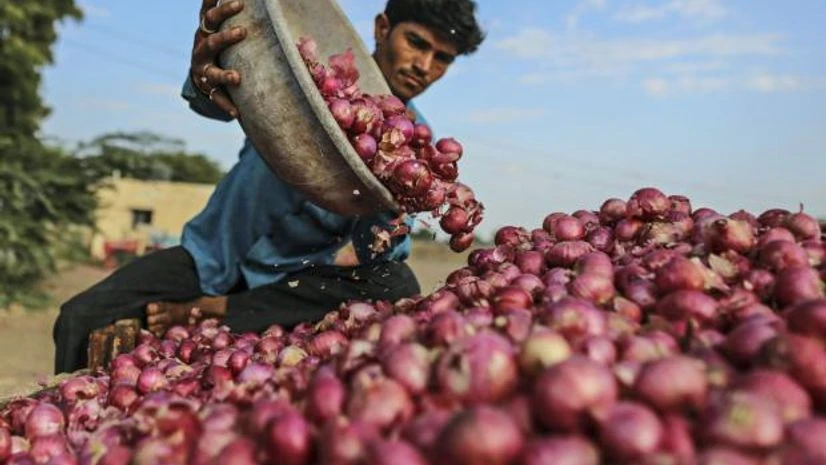Barely days after imposing a 40 per cent export tax on onions to cool down soaring prices, which, in turn, triggered widespread protests across the main growing belts, the Centre on Tuesday sought to mitigate both political and economic tensions gripping parts of Maharashtra.
It decided to procure an additional 200,000 tonnes of onions at Rs 2,410 per quintal for its buffer stock from farmers, a rate that is strikingly close to the price at which they were being exported before the 40 per cent duty was levied on August 19. The export price before the imposition of the duty stood at around $320 per tonne free on board (approximately Rs 2,650 per quintal).
“Several political opponents are trying to paint a wrong picture [of export restrictions]. I urge all farmers in onion-producing states not to worry or resort to any panic selling. The National Cooperative Consumers’ Federation (NCCF) of India and the National Agricultural Cooperative Marketing Federation (Nafed) of India have been instructed to procure onions from farmers,” Food and Consumer Affairs Minister Piyush Goyal told reporters.
The decision to purchase the extra onions was made amid protests from farmers in the main growing areas of Maharashtra, who feared a sharp decline in realisations due to the hefty duty.
The Centre maintains a buffer stock of 300,000 tonnes of onions, a quantity that will now be expanded to 500,000 tonnes.
Also Read
On Monday, traders indefinitely suspended onion auctions in all agricultural produce market committees (APMCs) in Nashik, including Lasalgaon, the largest wholesale onion market in India.
Raju Shetty, head of Swabhimani Shetkari Sangathan, a prominent farmers’ group in Maharashtra, said the agitation would continue till the time the duty was withdrawn. “The government was not buying onions at the rate of Rs 24 when farmers needed it the most, in the month of June, when almost 40 per cent of the crop was damaged due to rains. Now when onions were getting some [good] price due to a rise in exports, the government has imposed a hefty export tax. This shows that it does not have a policy,” Shetty told Business Standard. He said if the government actually wanted to help consumers, it could have bought onions from the open market and sold them at a subsidised rate.
On the political front, sources said senior central ministers contacted key functionaries of the Maharashtra government, including Chief Minister (CM) Eknath Shinde and Deputy CM Ajit Pawar, in an effort to quell the tensions.
Calls were even placed to Deputy CM Devendra Fadnavis, who is on an official trip to Japan. Fadnavis later posted on social media platform X (formerly Twitter), stating that he had discussions with Union Home Minister Amit Shah and Union Commerce Minister Piyush Goyal regarding the onion issue, and that the Union government would procure 200,000 tonnes of onions at a rate of Rs 2,410 per quintal.
“Special procurement centres will be established in Nashik and Ahmednagar districts for this purpose, offering some relief to the state’s onion growers,” added Fadnavis.
A delegation of senior leaders from Maharashtra, led by state Agriculture Minister Dhananjay Munde, also met with top ministers of the central government on Tuesday to highlight the issue.
In Mumbai, Shinde stated that cold storage could provide a lasting solution to the challenges faced by onion farmers, and he has instructed officials to address this matter.
Speaking at a press conference alongside Deputy CM Pawar, he also revealed that the government was exploring the concept of an ‘onion bank’, with a panel headed by senior scientist and former Atomic Energy Commission chairman Anil Kakodkar established for this purpose.
The coordinated efforts of the Centre from Delhi to Mumbai were aimed at preventing any escalation of the crisis in Maharashtra. The newly allied Nationalist Congress Party (Ajit Pawar) faction wields significant influence over most of the APMCs and has been embroiled in a heated conflict with the rival faction led by Sharad Pawar.
Apart from Nashik and Ahmednagar, Nafed and NCCF have opened procurement centres in Lasalgaon, Pipalgaon, Umrane, and Manmad. In Madhya Pradesh, similar centres have been set up in Narsinghpur and Shajapur, among other locations, to benefit farmers.
Meanwhile, in Delhi, Goyal asserted that the decision to impose a 40 per cent export duty on onions was taken to safeguard consumer interests. Simultaneously, the Centre has also committed to purchasing an additional 200,000 tonnes of onions from farmers to avert any panic selling.
He also announced that the government would expand the size of the buffer stock and procure more from farmers if necessary.
“We value both consumers and farmers. The government has been making decisions in the best interests of both farmers and consumers,” he affirmed.
Regarding export shipments currently stranded at ports, the Directorate General of Foreign Trade will make decisions concerning shipments for which bills were generated before the imposition of the export duty.
Goyal also stated that the sowing of kharif onions is in progress, and if the total coverage remains consistent with the previous year’s levels, production is anticipated to improve.
“Over the past two years, onion production stood at around 31.7 and 31.8 million tonnes. With higher acreage in kharif, we are optimistic about robust production this year,” Goyal commented.
Munde, also present at the media briefing, assured, “Despite the export duty, farmers will not be affected. They will obtain better prices for their produce, while consumers will still have access to reasonably priced onions.”
Between April 1 and August 4 of this financial year (2023-24), the country has exported 975,000 tonnes of onions. In terms of value, the top three importing countries are Bangladesh, Malaysia, and the United Arab Emirates.

)
